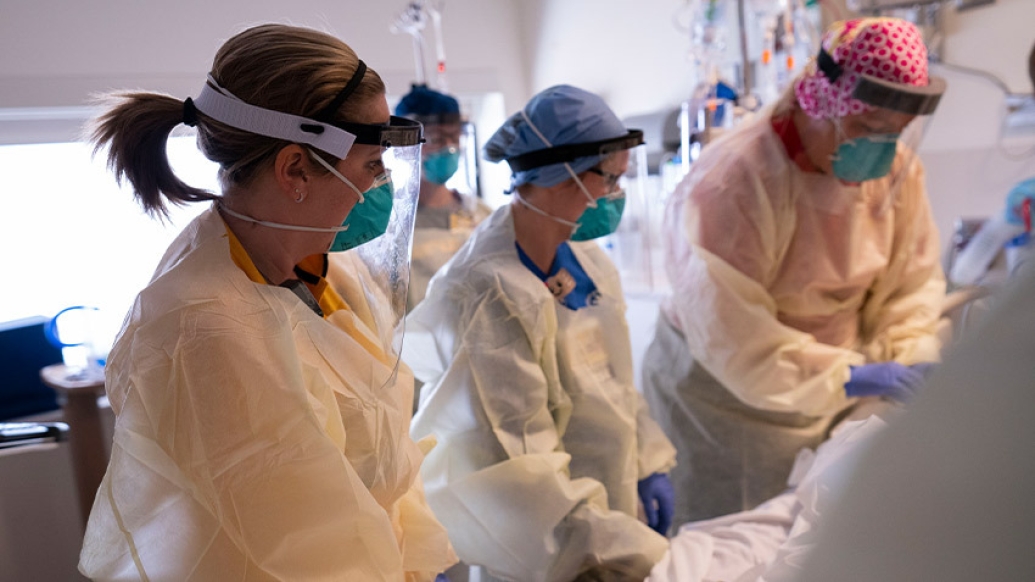A hotline launched during the pandemic offers hospitals far and wide access to clinical support when caring for the sickest of patients.
5:00 AM
Author |

Last summer, predictive analytic models began to indicate that the combination of influenza and a potential COVID-19 winter resurgence would pose a dual threat for exceeding intensive care unit capacity across the state.
In a proactive move, leaders from Michigan Medicine's University Hospital and Frankel Cardiovascular Center assembled a task force and engaged key stakeholders in developing strategies to improve clinical care for critically-ill COVID-19 patients in hospitals throughout Michigan.
The goal: to improve outcomes for COVID-19 ICU patients.
Using lessons learned from the spring 2020 COVID-19 surge, the team designed a plan to provide statewide outreach, education, collaboration and clinical support. Together, in partnership with Blue Cross Blue Shield of Michigan's Value Partnerships Director, Thomas Leyden, they created a strategy to prepare Michigan hospitals and providers for a resurgence.
A two-part plan
Recognizing that hospitals and health systems have had different experiences and lessons learned throughout the pandemic, the task force knew that a forum for giving and receiving information could benefit patients across the state.
The team identified the Mi-COVID19 Initiative, a joint collaborative quality improvement initiative under the Michigan Hospital Medicine Safety Consortium, as a platform that could foster effective, broad-reaching communication.
Under the leadership of Scott Flanders, M.D., chief clinical strategy officer for Michigan Medicine, the vice chair of external relations for the Department of Internal Medicine and program director for the Hospital Medicine Safety Coordinating Center at Michigan Medicine, the task force planned and launched a series of weekly statewide webinars in collaboration with multidisciplinary experts from Beaumont Health, Henry Ford Health System, Sparrow Hospital, Spectrum Health, St. Joseph Mercy Health System and others.
The webinar series wrapped up in late February but the information shared continues to benefit health systems across Michigan.
"The purpose of the webinars was to share evidence-based resources to optimize the care of COVID-19 patients," says Jakob McSparron, M.D., associate professor of pulmonary and critical care medicine in the Department of Internal Medicine.
McSparron, who facilitated a number of the webinars, served as co-director of Michigan Medicine's Regional Infectious Containment Unit, also referred to as the RICU, during the height of the pandemic last spring and summer.
"The weekly webinars provided an opportunity for hospital leaders and care teams from across the state to connect and learn from each other about best practices, effective protocols, therapeutics and more," he says.
Financial support for the webinars was provided by Blue Cross and Blue Shield of Michigan and Blue Care Network, as part of the Blue Cross Blue Shield of Michigan's Value Partnerships program.
"The collaborative quality improvement platform has always been such an incredible resource to the state of Michigan and to the larger national and international health care community," said Leyden, of Blue Cross Blue Shield of Michigan. "In 2020, with the arrival of the pandemic, we were extremely impressed with the ability of collaborative quality improvements to evolve and rapidly respond to the changing needs of their various provider communities in meeting the health care needs of their patients. The pace at which new learnings came out of the collaborative quality improvements was awe-inspiring."
Clinical support
The second part of the plan was to develop a multidisciplinary phone line to provide support and just-in-time medical information to clinicians and hospitals across the state. Michigan Medicine's COVID-19 Colleague Connect clinical support line, also funded by Blue Cross and Blue Shield of Michigan, went live with a soft launch in late November.
Although the clinical support line was originally scheduled to be live through mid-March, the uptick in cases across the state this spring caused the team to relaunch the COVID-19 Colleague Connect line, which is available seven days a week, from 7 a.m. to 7 p.m.
"The clinical support line was designed to help mitigate escalation of COVID-19 symptoms with early intervention," says Greta Krapohl, Ph.D., "and to provide support and guidance to caregivers across the state as they work to stabilize, manage and treat these critically-ill patients."
Establishing the clinical support line
"A number of colleagues and departments have come together to develop, manage and staff the COVID-19 Colleague Connect clinical support line," says David C. Miller, M.D., M.P.H., Michigan Medicine president and executive vice dean of clinical affairs for the University of Michigan Medical School. "We are grateful for the expertise of the team and their efforts to make this resource available to patients and hospitals across the state."
"Critical care physicians, nurses and pharmacists with experience caring for critically-ill COVID-19 patients staff the support line seven days a week," says Hitinder Gurm, M.D., the associate chief clinical officer of the cardiology and neurology sub-segment at Michigan, who helped set the vision and assemble the project team for this work. "In addition to talking with callers, faculty and staff working the support line research information when needed and follow up on each call. An informationist from the Taubman Health Sciences Library joined the team to help as well."
MORE FROM THE LAB: Subscribe to our weekly newsletter
Calls to the support line are routed through M-LINE, an existing toll-free number for referring physicians to schedule appointments, speak to Michigan Medicine providers, transfer patients and request patient information. M-LINE handles nearly 100,000 calls annually from 13,000 providers across Michigan and northern Ohio.
COVID-19 Colleague Connect was a natural fit with M-LINE and, at the end of each week, Krapohl and Moreland meet with staff members from Physician Relations and Outreach, Josie Aguirre, M.A., administrative director, and Laura Rowland, assistant director, to review the week's activities and discuss potential improvements for the clinical support line.
Help just a phone call away
"During my service as a nurse in the U.S. Army," says Krapohl, "there were circumstances when I was in remote locations with few resources, so I know what it's like to have a patient's life in your hands. The support line is to help clinicians around the state who have questions as they care for these very vulnerable and sick patients."
According to Krapohl, the topics discussed range the full spectrum of COVID-19 care, from testing to vaccination. She reported that most calls have centered around the opportunity to discuss best practices and therapies such as the use of monoclonal antibodies, protocols surrounding steroid and anti-coagulation therapy, extracorporeal membrane oxygenation, also known as ECMO, and the availability for clinical trials.
A community built on collaboration
"When Michigan Medicine leadership approached us about the opportunity to provide an additional level of support to hospitals, providers and statewide ICU patients through the expansion of their clinical support line to becoming a statewide resource for all Michigan hospitals, we were thrilled to be able to support," says Leyden. "We are so proud — and appreciative — of the incredible work being conducted through our statewide collaborative quality improvements platform, the majority of which is led by physician leaders from Michigan Medicine."
"I think one of the main benefits of this collaborative work is how much it has strengthened relationships between care teams across the state," says McSparron. "I am now much more connected with colleagues at other hospitals and health systems. It gives us all a sense of community, which perhaps is a silver lining that will carry on even after the pandemic comes to an end."
"I am honored to be part of this project because it encompasses all the values important to Michigan Medicine," says Krapohl, "and I'm so impressed with all of the departments and colleagues that have made this happen. It's easy to say you support front-line workers, but this project puts those words into action. The webinars and support line have helped us care not only for patients, but also for each other."
Like Podcasts? Add the Michigan Medicine News Break on iTunes, Google Podcast or anywhere you listen to podcasts.

Explore a variety of healthcare news & stories by visiting the Health Lab home page for more articles.

Department of Communication at Michigan Medicine
Want top health & research news weekly? Sign up for Health Lab’s newsletters today!





